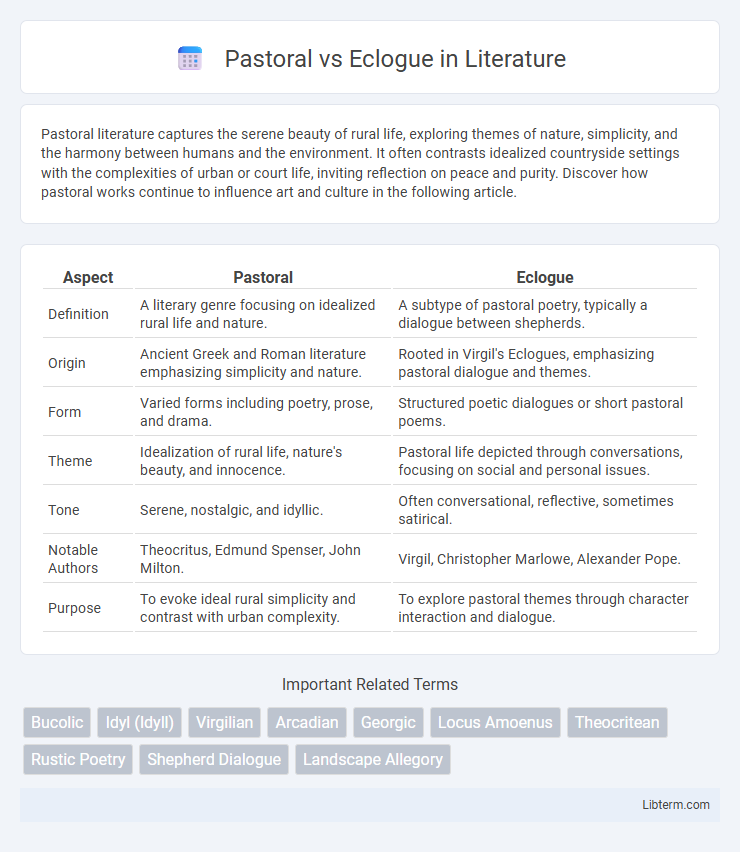Pastoral literature captures the serene beauty of rural life, exploring themes of nature, simplicity, and the harmony between humans and the environment. It often contrasts idealized countryside settings with the complexities of urban or court life, inviting reflection on peace and purity. Discover how pastoral works continue to influence art and culture in the following article.
Table of Comparison
| Aspect | Pastoral | Eclogue |
|---|---|---|
| Definition | A literary genre focusing on idealized rural life and nature. | A subtype of pastoral poetry, typically a dialogue between shepherds. |
| Origin | Ancient Greek and Roman literature emphasizing simplicity and nature. | Rooted in Virgil's Eclogues, emphasizing pastoral dialogue and themes. |
| Form | Varied forms including poetry, prose, and drama. | Structured poetic dialogues or short pastoral poems. |
| Theme | Idealization of rural life, nature's beauty, and innocence. | Pastoral life depicted through conversations, focusing on social and personal issues. |
| Tone | Serene, nostalgic, and idyllic. | Often conversational, reflective, sometimes satirical. |
| Notable Authors | Theocritus, Edmund Spenser, John Milton. | Virgil, Christopher Marlowe, Alexander Pope. |
| Purpose | To evoke ideal rural simplicity and contrast with urban complexity. | To explore pastoral themes through character interaction and dialogue. |
Defining Pastoral and Eclogue: Core Concepts
Pastoral literature idealizes rural life by portraying shepherds and rustic settings as symbols of simplicity and harmony with nature, emphasizing themes like innocence and escape from urban complexity. An eclogue is a specific form of pastoral poetry, typically a short dialogue between shepherds that explores both idyllic and sometimes realistic or philosophical reflections on life. While pastoral is a broader category describing the thematic celebration of countryside life, eclogue refers to the structured poetic format within that tradition, often written in dialogue form.
Historical Origins of Pastoral and Eclogue
The pastoral genre originated in the Hellenistic period, reflecting an idealized depiction of rural life and nature, often showcasing shepherds and rustic settings as a contrast to urban sophistication. Eclogues, a specific form of pastoral poetry, were popularized by the Roman poet Virgil in the 1st century BCE, embedding dialogues between shepherds and emphasizing poetic dialogue and social commentary within bucolic themes. These origins highlight the transformation of pastoral from Greek idyllic origins to Roman literary innovation, shaping Western poetic tradition.
Key Features of Pastoral Literature
Pastoral literature centers on idealized rural life, emphasizing simplicity, harmony with nature, and often featuring shepherds as symbolic figures. Key features include romanticized landscapes, pastoral dialogues or monologues, and themes of love, innocence, and nostalgia for a simpler existence. Unlike eclogues, which are specific dialogues or poems within the pastoral tradition, pastoral literature encompasses a broader genre reflecting rural life's virtues and challenges.
Eclogue: Structure and Literary Devices
Eclogues are short pastoral poems typically structured as dialogues between shepherds, emphasizing rural life and natural simplicity. They use literary devices such as pastoral imagery, metaphor, and symbolism to explore themes of love, nature, and sometimes political allegory. The structured alternation of voices in eclogues highlights contrasting perspectives, enhancing the poetic dialogue and thematic depth.
Major Themes in Pastoral vs Eclogue
Pastoral poetry typically explores themes of idealized rural life, nature's harmony, and innocent simplicity, often contrasting the purity of the countryside with the corruption of urban existence. Eclogues, a specific subset of pastoral, emphasize dialogues between shepherd characters, highlighting themes of love, political allegory, and poetic competition within bucolic settings. Both genres celebrate nature, but eclogues incorporate a more structured, dramatic framework that deepens thematic exploration through character interaction and narrative tension.
Famous Pastoral Writers and Works
Pastoral literature often idealizes rural life, with famous writers like Virgil, whose "Eclogues" are seminal works in the genre, blending poetry and dialogue to depict shepherds' lives. Christopher Marlowe's "The Passionate Shepherd to His Love" and Edmund Spenser's "The Shepheardes Calender" further exemplify the pastoral tradition in English literature. These works emphasize nature, simplicity, and romanticized countryside themes, distinguishing pastoral from the more dialogic and sometimes satirical eclogue form.
Notable Eclogue Poets and Examples
Notable eclogue poets include Virgil, whose "Eclogues" set the standard for pastoral poetry by blending rustic themes with classical elegance. The works of Theocritus, often regarded as the originator of the eclogue form, depict idyllic rural life through dialogue between shepherds, emphasizing simplicity and nature. Modern examples include William Blake's "Laughing Song," which adapts eclogue elements to explore joy and innocence in a pastoral setting.
Pastoral and Eclogue: Similarities and Differences
Pastoral and eclogue both depict rural life, emphasizing nature, simplicity, and shepherds, yet pastoral serves as a broader literary genre while eclogue specifically denotes short, dialogue-driven poems. Pastoral poems often explore idealized landscapes and themes of love or politics, whereas eclogues typically focus on conversational exchanges between shepherd characters. Key differences include structure, with eclogues characterized by their dramatic form, and thematic scope, as pastorals provide more varied and expansive treatments of countryside life.
Influence on Modern Literature
Pastoral literature, originating from ancient Greek and Roman traditions, heavily influences modern literature by idealizing rural life and nature, shaping themes of simplicity and harmony found in contemporary poetry and prose. Eclogues, a specific form of pastoral poetry exemplified by Virgil's works, contribute structured dialogues and character-driven narratives that inspire modern literary techniques in conveying social and political commentary. The enduring impact of both forms is evident in their ability to blend idyllic settings with complex human emotions, influencing modern authors' approaches to exploring societal issues through nature-inspired metaphors.
Conclusion: The Lasting Legacy of Pastoral and Eclogue
The lasting legacy of Pastoral and Eclogue literature is evident in their profound impact on Western literary traditions, inspiring countless poets from the Renaissance to modern times. Pastoral poetry, with its idealized rural settings and exploration of nature's harmony, continues to influence environmental and romantic themes across genres. Eclogues, as structured dialogues often depicting shepherds, have shaped narrative forms and pastoral conventions, underscoring the enduring interplay between nature, art, and human emotion.
Pastoral Infographic

 libterm.com
libterm.com